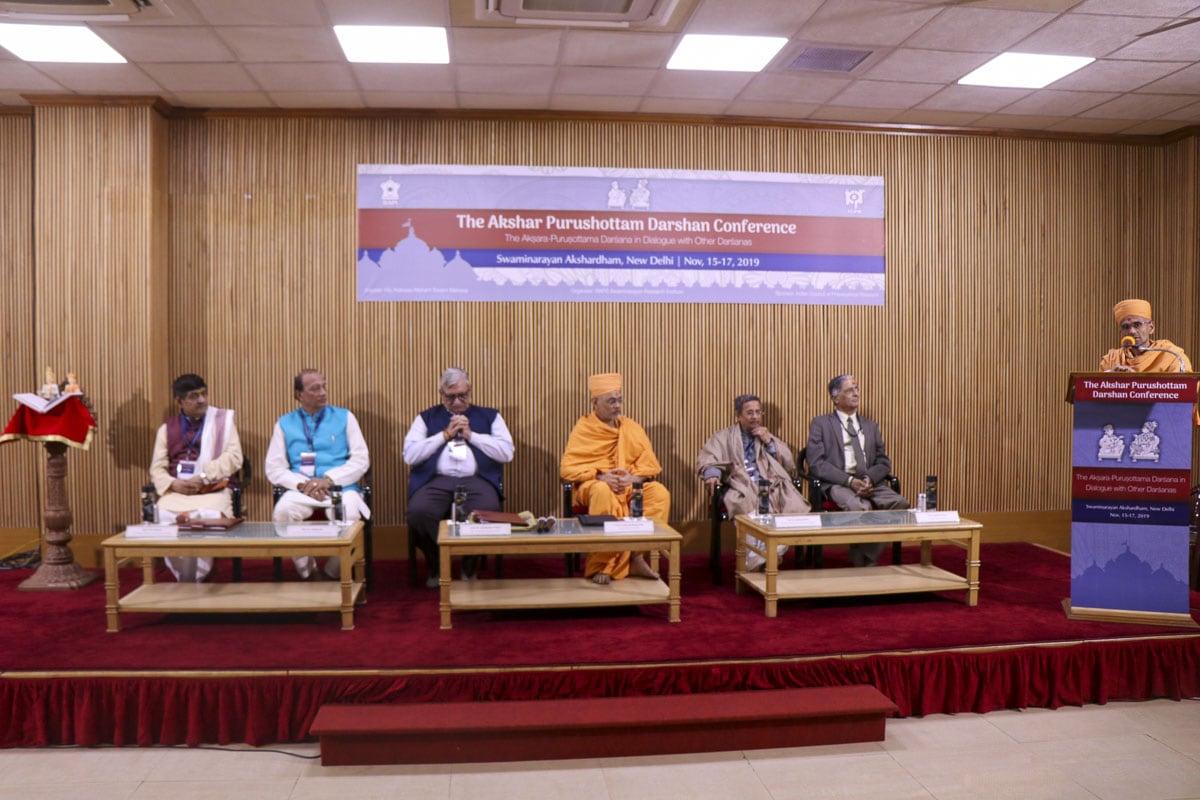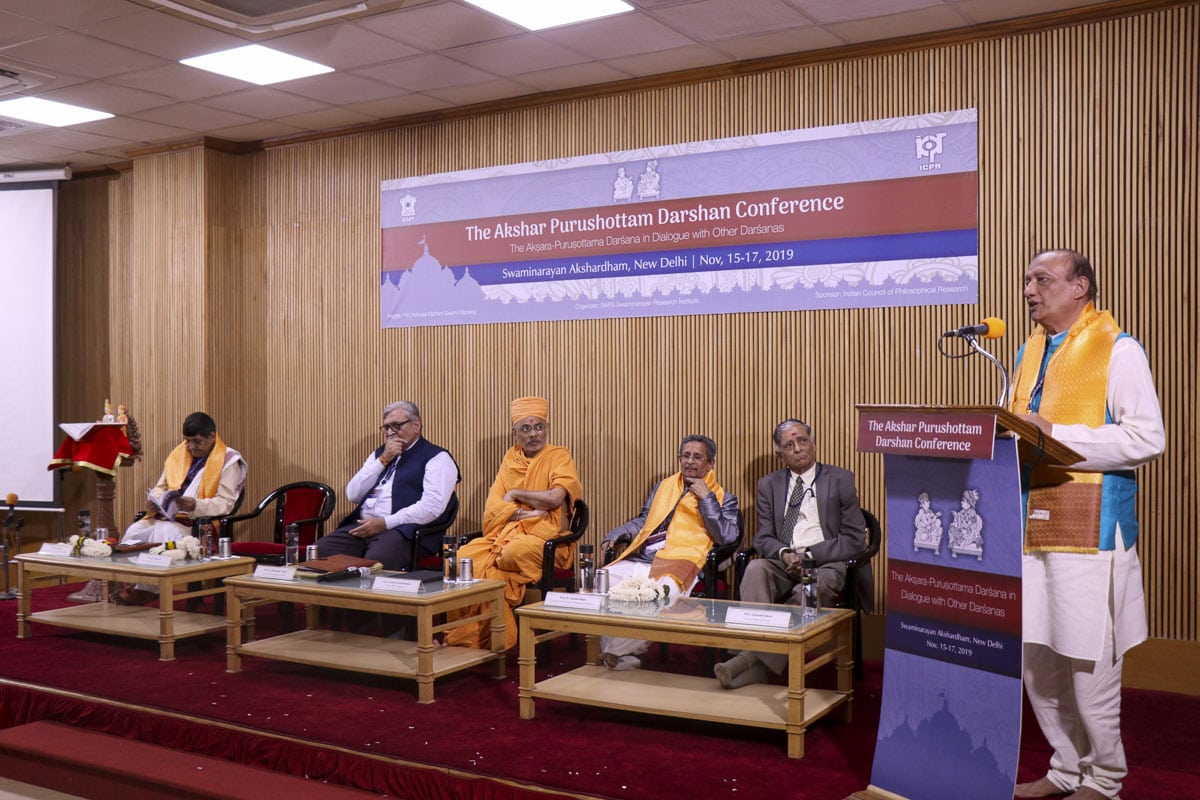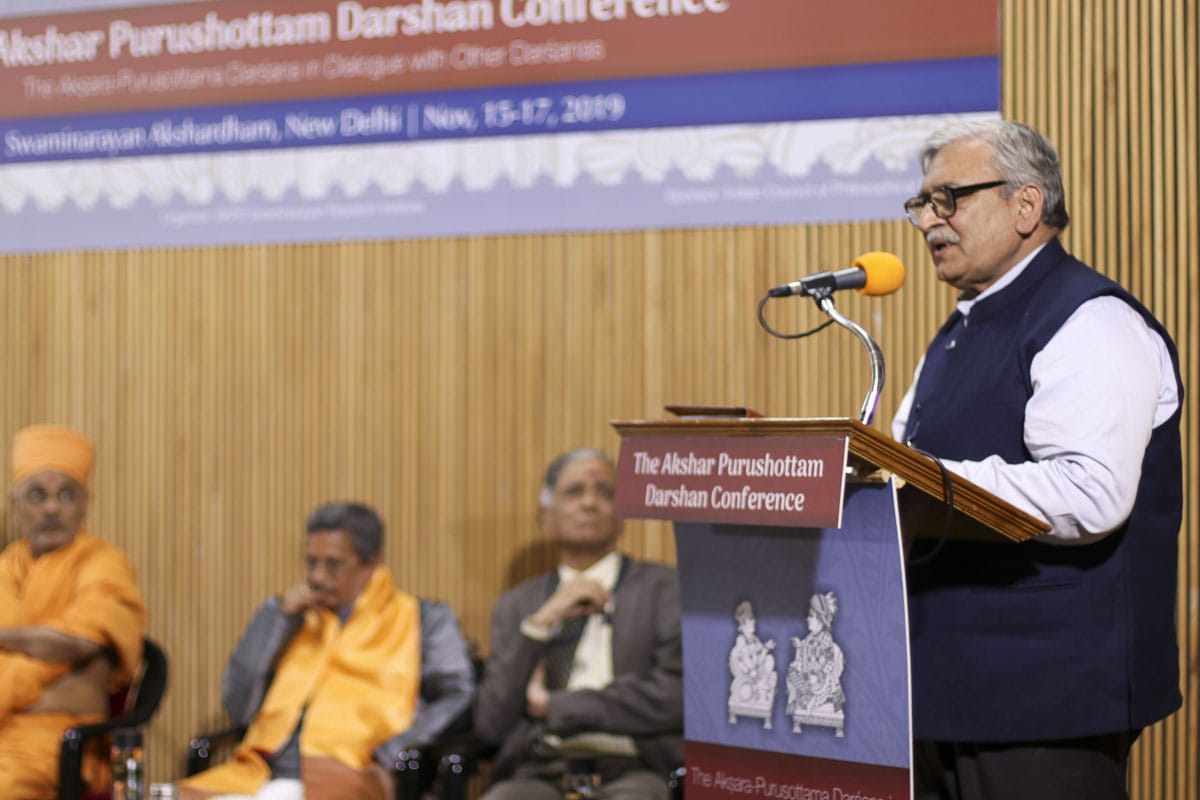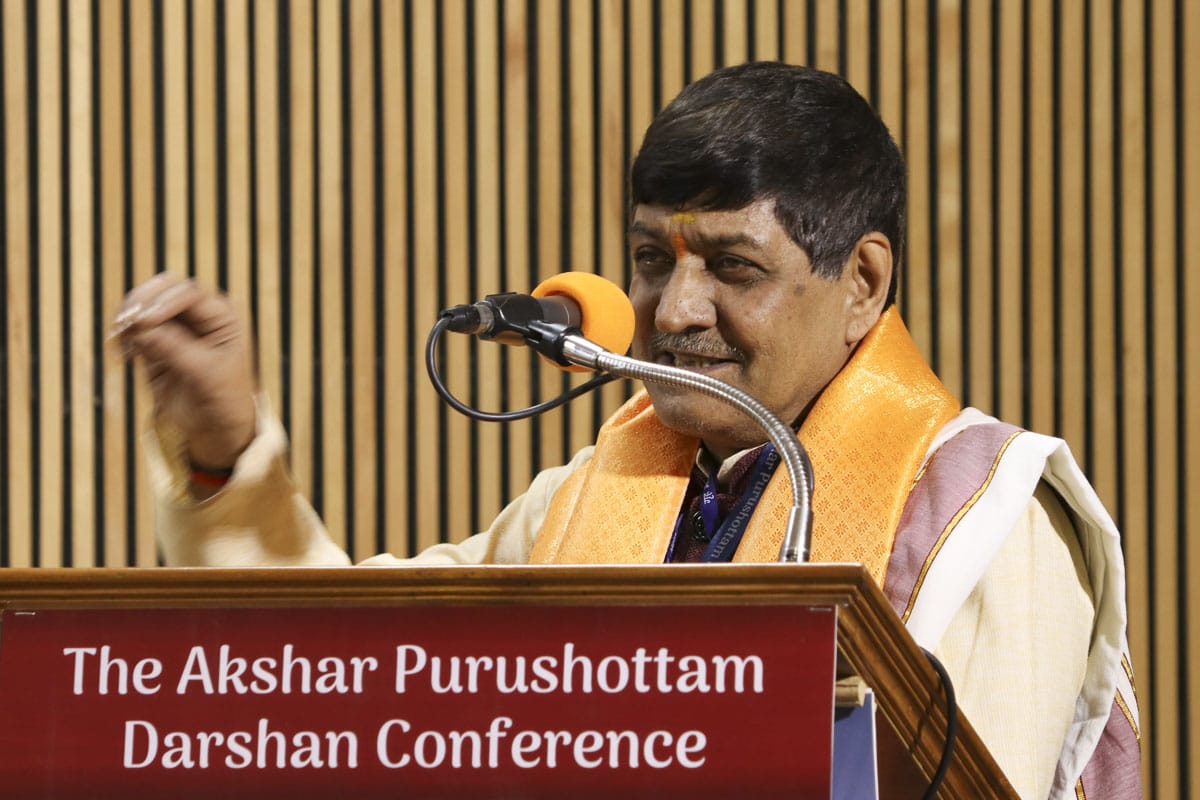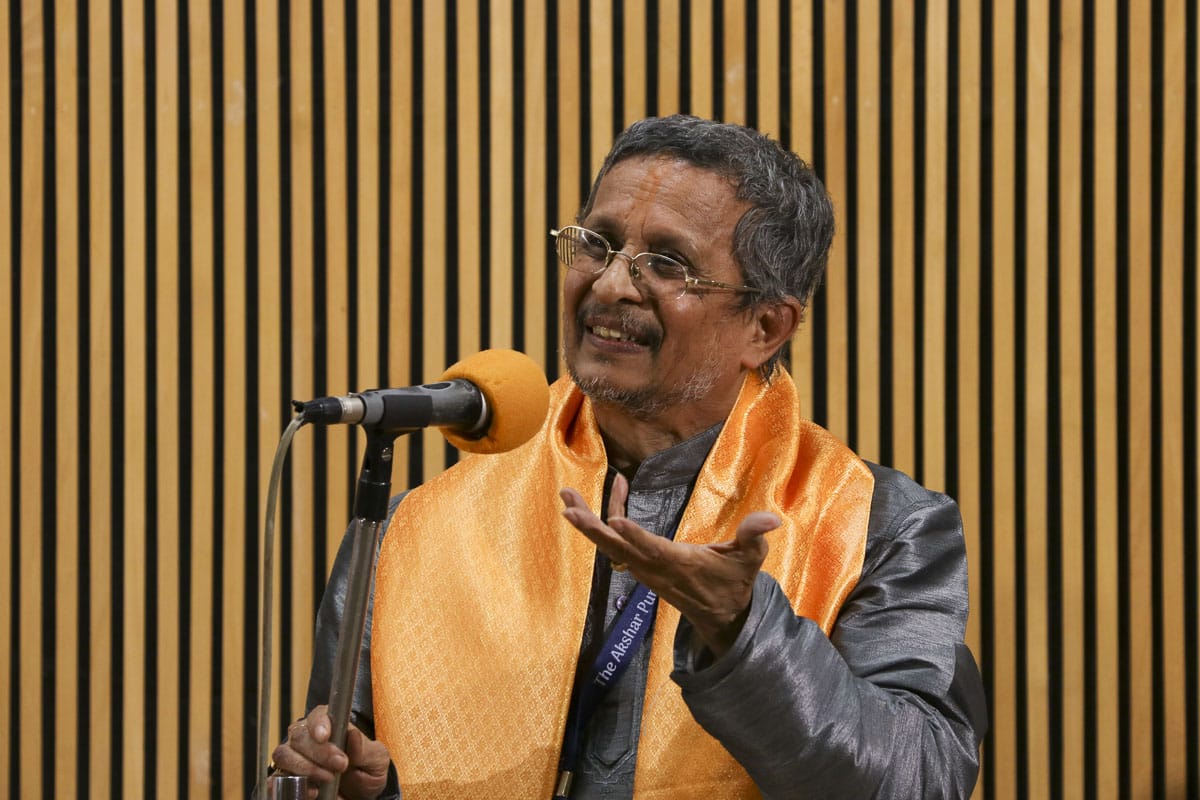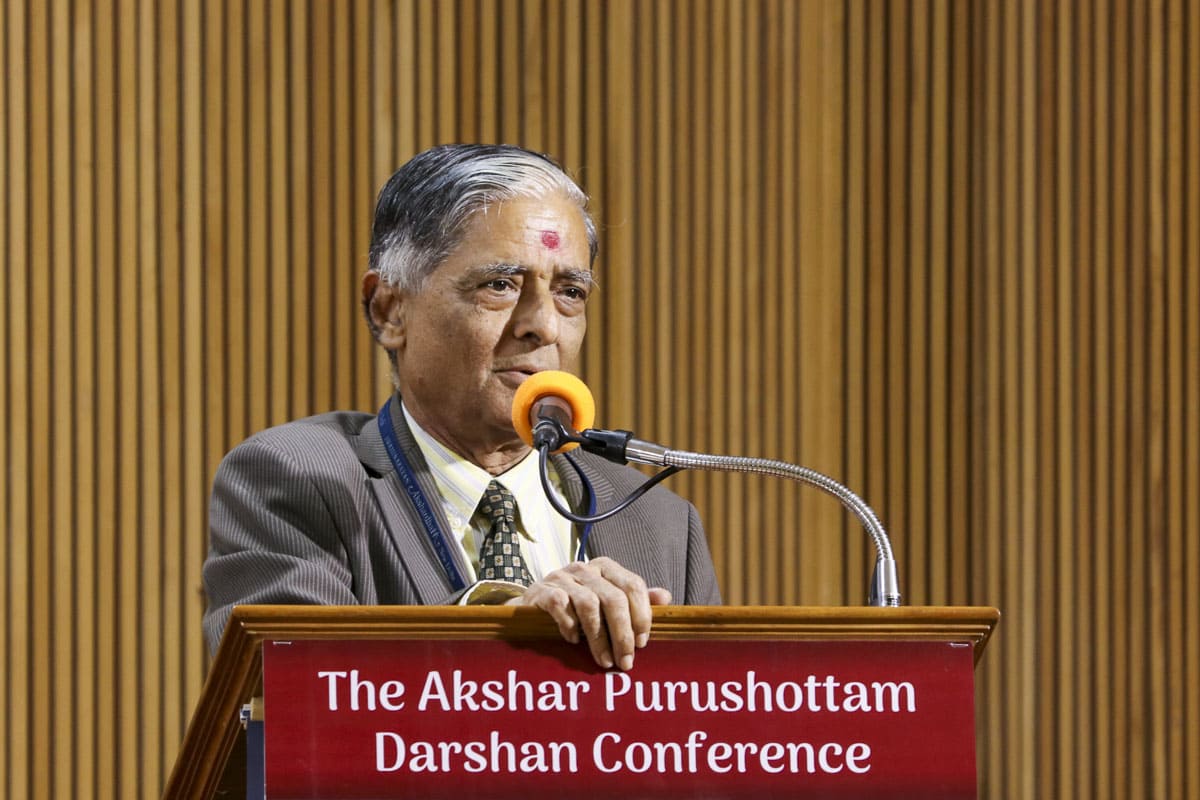“The conference afforded me with the rare opportunity to meet with renowned scholars.”
Under the benefaction of The Indian Council of Philosophical Research (ICPR), the BAPS Swaminarayan Research Institute conducted a three-day conference (15 -17 Nov. 2019) titled: ‘The Akṣara-Puruṣottama Darśana in Dialogue with Other Darśanas’. Scholars at the conference presented in-depth research on the Akṣara-Puruṣottama Darśana from their unique disciplinary perspectives and also engaged in productive reflections and discussions on the topics presented.
Śrī Krishna Pandaji, an instructor at the BAPS Swaminarayan Sanskrit Mahavidyalay, under the guidance of Shrutiprakashdas Swami, Bhadreshdas Swami and Atmatruptdas Swami coordinated and administrated the conference. Atmatruptdas Swami conducted the conference’s various proceedings and sessions.
Among the acclaimed scholars from throughout India who presented their research at the conference were Śrī S.R. Bhaṭṭa, president of the Indian Philosophical Congress and former president of ICPR; Śrī R.C. Sinhā, president of ICPR; Prof. Śrī Jaṭāśaṅkarajī, president of Akhila Bhāratīya Darśana Pariṣad; Mahāmahopādhyāya Śrī Vaśiṣṭha Tripāṭhī (Vārāṇasī); Śrī Rameśakumāra Pāṇḍe, vice-chancellor of Lālabahādura Rāṣṭrīya Saṃskṛta Vidyāpīṭha (New Delhi); Śrīnivāsa Varakheḍī, vice-chancellor of Kavi Kulaguru Kālidāsa Viśvavidyālaya (Nāgapura); Śrī Haridāsa Bhaṭṭajī, principal of Pūrṇaprajña Saṃskṛta Vidyāpīṭha (Bangalore, Karnataka); Prof. Śrī P.N. Śāstrī, vice-chancellor of Rāṣṭrīya Saṃskṛta Saṃsthāna (Delhi); and Prof. Paṅkaja Jānī, vice-chancellor of Maharṣi Pāṇini Saṃskṛta Viśvavidyālaya (Ujjain).
The inaugural session of the three-day conference commenced with a recitation of prayers from the Vedas and a ceremonial lighting of the dīpa. Munivatsaldas Swami, Koṭhārī of Swaminarayan Akshardham, welcomed all the delegates to the conference.
In his address, Prof. Śrīnivāsa Varakheḍījī, Vice-Chancellor of Kavi Kulaguru Kālidāsa Saṃskṛta Viśvavidyālaya, stated:
“In the world it is believed that there are no novel contributions to be made in darśanic studies and that discussions continue on age-worn ideas. In other words, many claim that discussions are only conducted on outdated philosophies and that it is impossible for new philosophies to be born. However, when we listen to the principles of the Akṣara-Puruṣottama Darśana and read its commentarial works, we realize that an altogether distinct philosophical system is introduced. It serves as a prime example to demonstrate that original streams of Indian thought have not ceased to flow. The Akṣara-Puruṣottama Darśana is an original darśanic system and this conference is organized to highlight many of its distinctive features. This darśana possesses all of the requirements necessary to engage in dialogue with other darśanic systems. Mahāmahopādhyāya Bhadreshdas Swamiji has presented the principles of this darśana in the form of a commentary on sacred texts. I consider myself fortunate to have the opportunity to present on this new darśana.”
Thereafter, Prof. Rameśacaṃdra Pāṇḍejī, vice-chancellor of Lālabahādura Śāstrī Saṃskṛta Viśvavidyālaya, revealed:
“The Svāminārāyaṇabhāṣya on the Prasthānatrayī is a contemporary addition to the tradition of our ancient darśanas… The Akṣara-Puruṣottama Darśana is entirely founded on the revelations of the Vedas. Within this darśana, Bhagavān Svāminārāyaṇa’s Vacanāmṛta, Svāmīnī Vāto, the biographical accounts of the saṃpradāya’s gurus, the ‘Siddhāntapatra’ authored by Pramukh Swami Maharaj, and the blessings of the manifest guru present to us five nectars—the pañcāmṛta.”
In his address, Śrī Rameśacaṃdra Sinhājī, president of the ICPR, then shared the nature of his close relationship with the Svāminārāyaṇa Saṃsthā and recalled his heartfelt meeting with Pramukh Swami Maharaj at the BAPS mandir in Sarangpur. He also acclaimed Bhadreshdas Swami as an abhinava bhāṣyakāra (a modern commentator). He thereafter applauded the Svāminārāyaṇa Saṃpradāya’s beneficence and dedication towards social service.
Śrī Vaśiṣṭha Tripāṭhījī from Vārāṇasī then expressed his earnest sentiments by stating:
“The tradition of providing extensive expositions on aphorisms and authoring insightful commentaries extends back thousands of years. Prior to authoring his commentary, Bhadreshdas Swamiji studied various sacred texts and became well-acquainted with the intricacies of darśanic reflection… Bhadreshdas Swami authored the commentary to benefit all… I have read through his entire commentary. There is not a single letter that contradicts the śrutis. His effort is incomparable… The Akṣara-Puruṣottama Darśana is rooted in the Vedas… The purity of the sadhus we find here is unparalleled.”
Thereafter, Śrī S.R. Bhaṭṭajī stated, “At this moment, I congratulate Bhadreshdas Swami, who has offered us great advice. Swamiji’s commentary is a testament to the living darśanic tradition.”
At the conclusion of the inaugural session, Bhadreshdas Swami summarized the goals of the conference in his keynote address:
“It is natural to engage in dialogue. However, only discussions that are free of obstinance and malice give birth to a darśana. As the source of new darśanic systems, our ancient sacred texts, such as the Upaniṣads and the Gītā, serve as examples of such constructive dialogues. Bhagavān Svāminārāyaṇa’s Vacanāmṛta is also a prime example of such a discussion. The dialogues recorded in the Vacanāmṛta have given birth to a unique darśana, which is identified as the ‘Akṣara-Puruṣottama Darśana.’”


